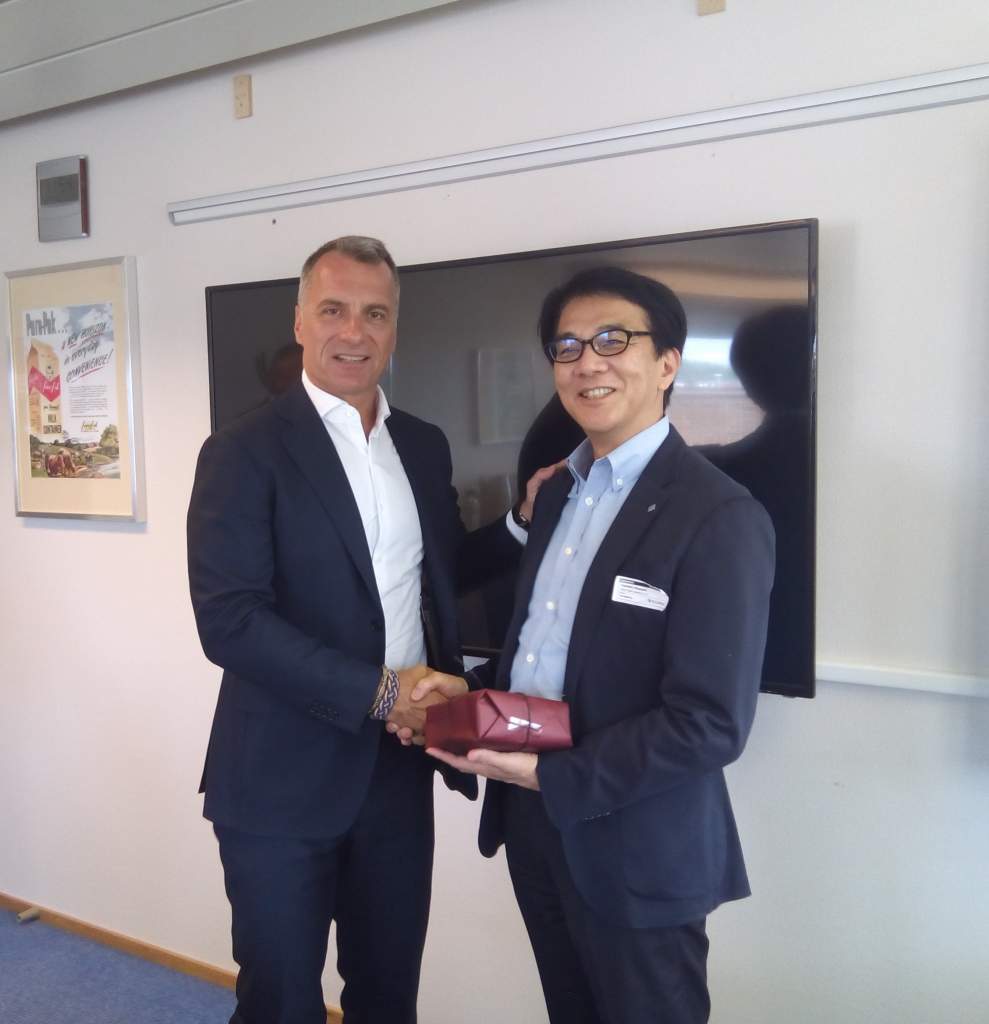Elopak and Nippon Paper Industries Sign MoU
Elopak and Nippon Paper Industries sign Memorandum of Understanding (MoU) to strengthen partnership and advance collaborative efforts in the field of liquid-paper packaging.
Elopak and Nippon Paper Industries sign Memorandum of Understanding (MoU) to strengthen partnership and advance collaborative efforts in the field of liquid-paper packaging.

(8th February 2022) Elopak ASA (President & CEO: Thomas Körmendi, hereinafter “Elopak”, ticker “ELO”) and Nippon Paper Industries Co., Ltd (President and CEO: Toru Nozawa, hereinafter “Nippon Paper”) have signed a comprehensive Memorandum of Understanding (MoU). The agreement covers further collaboration between the two companies, looking at how potential business can be jointly developed and organised given their respective expertise, assets and networks.
Nippon Paper Industries, the largest liquid packaging player in Japan, is concentrating efforts in the field of paper packaging with the goal of contributing to the enrichment of people’s lives and the development of culture under the slogan of “Pioneering the future together with trees.” Based on the slogan “What can be done with paper,” Nippon Paper pursues the potential of paper packaging born from wood, a renewable resource, and offers a variety of proposals.
Elopak, a leading global supplier of carton packaging and filling equipment, offers sustainable packaging solutions that provide a natural and convenient alternative to plastic bottles. The MoU aligns with Elopak’s ambitions to meet the rising demand for sustainable packaging solutions by pursuing a growth strategy centered on investment in innovation; the pursuit of new business opportunities in existing and new markets across both fresh and aseptic markets; and driving the plastic to carton conversion.
The two companies have worked closely together for many years. In March 2016 they signed a product licensing agreement that allows Nippon Paper to manufacture and sell certain Pure-Pak® cartons in Japan. When Elopak listed on the Oslo Stock Exchange in June 2021, Nippon Paper entered into a cornerstone agreement to acquire shares equivalent to 5.0% of the share capital.
Under the MoU a Steering Committee will be established, tasked with selecting and implementing collaborative themes that leverage the strengths of both companies, while increasing competitiveness and expanding sales of paper packaging to accelerate the move toward a low carbon circular economy.
Collaboration between Nippon and Elopak is built on the companies’ shared commitment to sustainability and innovation. Both companies are members of the United Nations Global Compact and incorporate the UN’s Sustainable Development Goals (SDGs) into their development strategies. They also have a shared dedication to sustainable forest management and improved recycling of their paper products.
Commenting on the MoU Elopak CEO Thomas Körmendi stated, “We are delighted to be exploring the opportunities that exist for Elopak and Nippon to collaborate further. Building on our strong track record of working together to deliver for customers, we are excited by the opportunity to leverage our relative strengths and areas of expertise to drive the adoption of sustainable packaging solutions.”
Commenting on the MoU Nippon Managing Executive Officer and General Manager of Paper-Pak Sales Division Yasuhito Obayashi noted, “We are really excited by this opportunity to grow our strong relationship with Elopak and are looking forward to collaborative value creation based on both companies’ deep expertise and strength that delivers sustainable packaging solutions to market.”
About Nippon Paper Industries
The Nippon Paper Group is a company group that consists of multiple business which generates stable profits and better living and cultural progress.
It achieves this by using diverse technologies and know-how to maximize the use of renewable woody resources. This provides a wide range of products that help form a circulation-oriented society, supporting profit growth.
The main businesses are manufacturing & marketing of pulp and paper, paperboard, liquid packaging cartons, DP & chemical products, functional film, household paper, special paper, timber business, energy business, and so on. Founded in Tokyo in 1949, it employs 16,000 people and its sales are more than 100 billion yen, as of today.